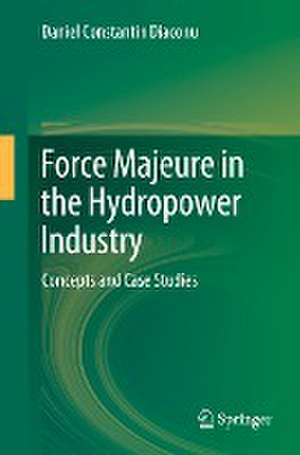Force Majeure in the Hydropower Industry: Concepts and Case Studies
Autor Daniel Constantin Diaconuen Limba Engleză Paperback – 23 mar 2023
Presented with the Award of the Senate of the University of Bucharest for the most prestigious book in the field of Life and Earth Sciences, 2022-2023.
Preț: 380.84 lei
Nou
Puncte Express: 571
Preț estimativ în valută:
72.88€ • 76.44$ • 60.67£
72.88€ • 76.44$ • 60.67£
Carte tipărită la comandă
Livrare economică 01-15 aprilie
Preluare comenzi: 021 569.72.76
Specificații
ISBN-13: 9783031274015
ISBN-10: 3031274016
Pagini: 156
Ilustrații: XI, 156 p. 35 illus., 32 illus. in color.
Dimensiuni: 155 x 235 mm
Greutate: 0.25 kg
Ediția:1st ed. 2023
Editura: Springer International Publishing
Colecția Springer
Locul publicării:Cham, Switzerland
ISBN-10: 3031274016
Pagini: 156
Ilustrații: XI, 156 p. 35 illus., 32 illus. in color.
Dimensiuni: 155 x 235 mm
Greutate: 0.25 kg
Ediția:1st ed. 2023
Editura: Springer International Publishing
Colecția Springer
Locul publicării:Cham, Switzerland
Cuprins
Chapter 1 Introduction.- Chapter 2 Water for energy versus energy for water.- Chapter 3. Energy sectors that use water.- Chapter 4. The context of the development of the World hydropower sector.- Chapter 5. The impact of drought on the hydropower domain.- Chapter 6. Force majeure.- Chapter 7. Sample contractual provisions, which must be contained in a force majeure contract.- Chapter 8. Concrete cases of invocation of force majeure.- Chapter 9. Romania, in a European energy context.- Chapter 10. Settlement of the dispute, in case the force majeure clause is invoked by Hidroelectrica SA.- Chapter 11. Electricity, systemic crises and environmental policies.
Notă biografică
Daniel Constantin Diaconu is an Assistant Professor of the Faculty of Geography, University of Bucharest. He holds a Master degree in water resources and obtained a PhD in Geography.
Textul de pe ultima copertă
This book aims to highlight the particular situation faced by certain hydropower companies by the fact that they cannot fulfil their contracts due to force majeure. The first part of this book will be an analysis of how water is used in electricity production. It is important to point out that all types of energy sources use water, to a different extent, of course, and that its spatial and temporal availability is very important. The focus will be on hydropower, presenting the current situation at the global level, and the effect of reducing the amounts of water in the river system.
The second part is based on the presentation of the concept of force majeure and the ways of presenting and drafting it in a contract. Many disputes or the success of a contract depended heavily on the provisions of this article of the contract. Obviously, there are also situations in which the signatory parties abuse or are not protected by these provisions of force majeure. Starting from a few brief examples from the international level, we reach a wide discussion of the situation created in Romania, when the largest supplier of electricity produced on the basis of water terminates several contracts invoking force majeure. The manner in which the opinion of the parties involved is presented to the court is analyzed and presented in detail.
Caracteristici
Presents up-to-date information on the concept of Force Majeure Insights into the evolution of water resources climate change and societal needs International case studies and examples of Force Majeure invocation
